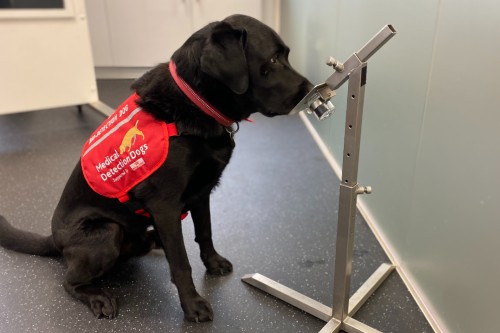Researchers often use judgment bias testing to assess animals' emotional states. In this method, dogs are trained to associate one location in a room with treats and another with no treats. When presented with intermediate locations where a treat may or may not be present, the dogs' responses are evaluated as an indicator of their emotional state. Dogs that eagerly run to these intermediate spots in hopes of a treat are considered to be showing a more "optimistic" response, indicating that they are in a more positive emotional state.
Previous research on judgment bias testing has largely overlooked medical detection dogs. However, in this new study, researchers from Bristol Veterinary School examined the statistical relationships between judgment bias scores, behavioural assessments, and performance on medical detection tasks for 27 medical detection dogs and 39 detection dogs in training.
Their analysis showed that more “optimistic” dogs, older dogs, and dogs who scored higher on tests assessing confidence, food orientation, and playfulness tended to score higher on detection tasks. However, among the fully trained medical detection dogs, those who were more “pessimistic” achieved a higher degree of specificity in scent detection tasks.
The authors add: “Our findings suggest that dogs displaying more ‘optimistic’ responses in a judgement bias test tend to demonstrate higher overall ability, as rated by their trainers. Understanding this link could help us to better train, select, and support successful medical detection dogs.
“Dogs that approached ambiguous cues more quickly also tended to have higher levels of trait confidence and playfulness. These insights could have important implications for training and selection methods in medical detection dogs.
“Working through the judgment bias test was particularly interesting, as it is a relatively simple and inexpensive methodology with the potential to provide valuable insights into dogs’ personalities and decision-making processes. These findings could be relevant not only to the performance of working dogs but also to the welfare of companion dogs.”
This study does not establish any cause-effect relationships, and more research will be needed to further evaluate the findings. However, the researchers suggest that these relationships might indicate that differences in dogs’ searching styles and performance in detection tasks could be influenced by underlying differences in affective or cognitive processes. They note that, pending further research, judgment bias testing could hold promise as a screening tool for potential detection dogs.
Paper
‘An exploratory study of associations between judgement bias, demographic and behavioural characteristics, and detection task performance in medical detection dogs’ by Sharyn Bistre Dabbah, Michael Mendl, Claire Guest, Nicola J. Rooney in PLOS One [open access]
